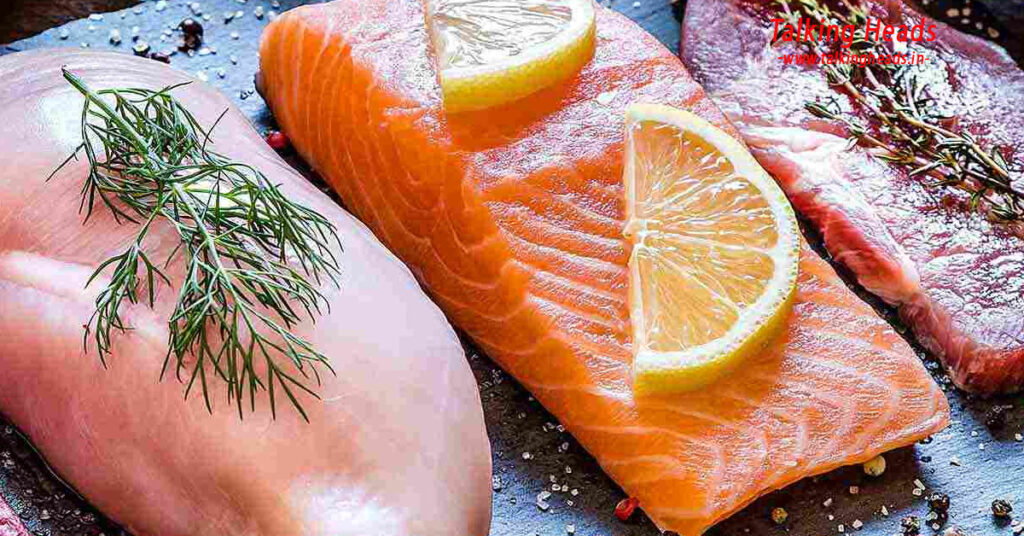Building muscle requires the right amount of protein intake, combined with proper exercise. Protein is essential for muscle repair and growth, making it a crucial nutrient for those aiming to increase muscle mass. But how much should you consume daily, and what are the best sources? Let’s explore research-backed insights on optimal intake for muscle gain.
Table of Contents
Why Is it Essential for Muscle Growth?
Protein is a fundamental building block of every cell and tissue in the body. It plays a vital role in various bodily functions, but its significance is particularly high in muscle repair and maintenance. When you engage in strength training or any form of exercise, your muscle fibers experience microscopic tears. it helps in repairing these fibers, making them stronger and promoting muscle growth.
How Much Protein Do You Need for Muscle Gain?
For individuals with a sedentary lifestyle, the recommended daily protein intake is 0.8 grams per kilogram of body weight. However, those who are actively trying to build muscle require significantly more.
Protein Intake for Muscle Gain
According to experts, people looking to gain muscle should consume 1.2 to 1.6 grams of protein per kilogram of body weight daily. For example:

- A person weighing 70 kg (154 lbs) should aim for 84 to 112 grams of protein per day.
- Athletes and bodybuilders may require even higher amounts, ranging from 1.6 to 2.2 grams per kilogram.
Additionally, the U.S. Department of Agriculture (USDA) suggests that 10-35% of daily calorie intake should come from protein. If someone consumes 2,000 calories per day, their protein intake should range between 50 and 175 grams.
How Does Protein Work in the Body?
it is composed of amino acids, which are crucial for cell and tissue formation. The human body utilizes 20 different amino acids, but it cannot produce nine essential amino acids on its own. These must be obtained from dietary sources.
When you consume protein-rich foods, they break down into amino acids during digestion. These amino acids are then used for various bodily functions, including:
- Tissue repair
- Muscle growth
- Immune system support
- Energy production
What Does Research Say
Several studies highlight the benefits of protein for muscle gain:
- A 2020 study published in the journal Nutrients found that consuming 0.5 to 3.5 grams of protein per kilogram of body weight can support muscle growth.
- Another 2022 study revealed that consuming 1.5 to 1.6 grams of protein per kilogram of body weight daily can significantly enhance muscle strength.
- Research also suggests that higher intake in older adults has limited benefits for muscle growth compared to younger individuals.
Best Sources of Protein for Muscle Gain
Protein can be obtained from both animal-based and plant-based sources:
Animal-Based Protein Sources
These sources contain all essential amino acids and are easily digestible:

- Eggs
- Chicken, beef, and mutton
- Fish (salmon, tuna, cod)
- Dairy products (milk, yogurt, cheese, whey protein powder)
Plant-Based Protein Sources

Plant proteins are beneficial but may require combining different sources for complete amino acid intake:
- Lentils and beans
- Soy products (tofu, soy milk, soy protein powder)
- Whole grains (quinoa, oats, brown rice)
To maximize plant-based protein intake, combine foods such as rice and lentils or whole wheat bread with peanut butter to ensure a balanced amino acid profile.
Can Too Much Protein Be Harmful? While protein is essential, excessive intake can lead to health concerns. Safe protein consumption levels vary based on activity levels and individual metabolism:
- Healthy adults can safely consume up to 2 grams per kilogram of body weight.
- Some elite athletes can tolerate 3.5 grams per kilogram, but this is not necessary for most individuals.
Potential Risks of Excessive Protein Intake
Digestive issues (constipation, bloating, indigestion)Headaches and fatigue
Increased strain on kidneys and liver
- Higher risk of dehydration
To avoid these risks, it’s crucial to balance protein intake with adequate fiber, hydration, and overall nutrient diversity.
Conclusion: Finding the Right Balance
For optimal muscle growth, consuming 1.2 to 1.6 grams of protein per kilogram of body weight daily is recommended. A combination of high-quality protein sources, strength training, and proper recovery will ensure effective muscle development. However, excessive protein intake may cause health issues, so it’s advisable to consult a nutritionist or healthcare professional to determine the right amount based on your fitness goals.










